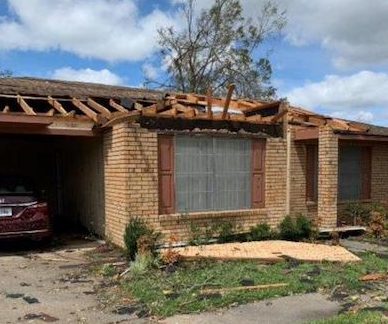New $11M housing program for LC
Published 5:00 am Tuesday, November 23, 2021

- One of the many homes in Lake Charles, La., that were damaged during Hurricane Laura in 2020.
Gov. John Bel Edwards announced an $11.3 million dollar housing program Monday to aid Lake Charles’ recovery from last year’s storms.
The $11.3 million is a collection of funds which will flow through the Louisiana Office of Community Development and will be administered by the City of Lake Charles.
“This is a beginning, a first step, a relatively modest first step, but it is one that has been made possible because of the persistent efforts of Mayor (Nic) Hunter but also the folks at the Louisiana Housing Corporation Office of Community Development and in partnership with Housing and Urban Development out of Washington,” Edwards said.
Two programs will be created from the funds: COLC Home Rehabilitation and Recovery Program, which will address unmet needs and the City of Lake Charles Small Rental Rehabilitation Program, which will provide assistance in the form of grants.
“The focus will be homeowners with low to moderate income — people most in need and have the hardest time effecting a robust recovery,” he said.
While Monday’s announcement is good news, Edwards was careful to add that “this is not enough” to meet the full scope of the region’s recovery needs even combined with the $595 million Congressional appropriation made a few weeks ago for Louisiana’s 2020 storm recovery. “We have to acknowledge at the outset that it is insufficient for the type of recovery that we all expect to be able to deliver.”
Lake Charles Mayor Nic Hunter was present at Monday’s announcement in Baton Rouge and echoed Edward’s sentiments. “No community, quite frankly in recent history, has waited longer for Supplemental Disaster Aid and when the first tranche finally came it had a smaller allocation for what has actually befallen us.”
Despite that reality, Hunter called the $11.3 million a “win” as it signals support for the city’s recovery from state and federal entities. The programs that the city will administer will focus on under-insured or uninsured residents, Hunter said.
Other awards from non-profits or FEMA will not disqualify a resident for being eligible for the awards which will have a $50,000 cap per household. “If someone received a FEMA award they can still apply for this program,” Hunter said.
“FEMA awards were not enough to really re-establish themselves in a healthy, sustainable, way.”
Homeowners who use their property as a rental will also be able to participate in one of the programs as long as they sign an agreement that they will rent out to low to moderate income families, he added.
While all details are still being finalized for the program, the city does have a program manager already in place and funds are expected to be available in the coming weeks. Hunter said the program will also partner with a local non-profit to conduct the case management related to the program.
Additionally, the region is still awaiting its allocation of the $595 million Community Development Block Grant but Edwards remained adamant that another $700 million is necessary for full recovery. “The $595 (million) is a good start but it’s not enough to meet the housing need even if all of it went to housing and you can’t even put it (all) towards housing based on the restraints you have…”
The goal for full recovery is $1.3 billion – $1 billion for housing and the additional funds for mitigation, public assistance and administration, he said. “I’m confident that additional assistance will be made available…I’ve yet to talk to anyone in Congress, the White House or administration who is not in favor of additional assistance.”





